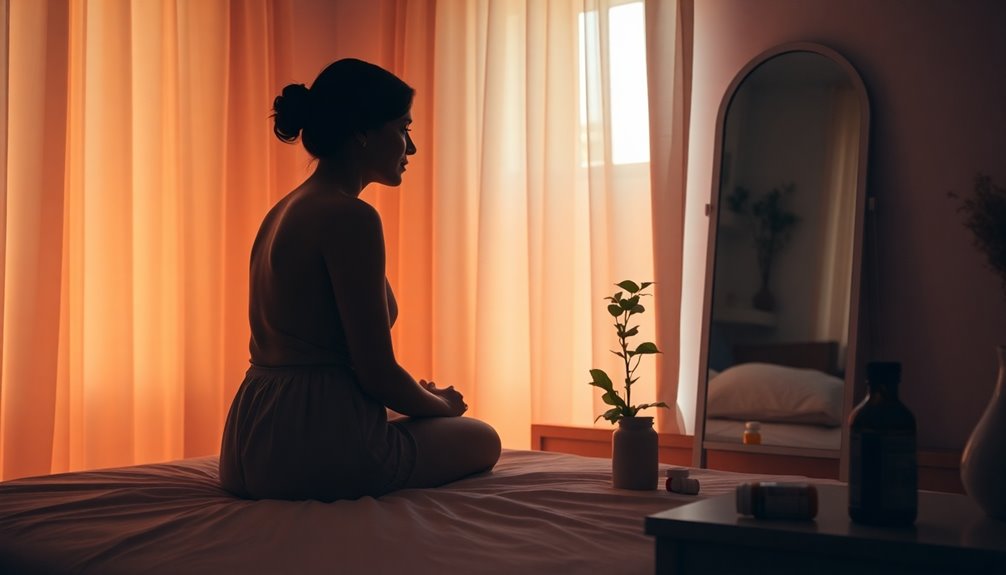If you're experiencing a low sex drive, it could be due to hormonal changes, such as during menopause or pregnancy. Psychological factors like anxiety, depression, and stress can also greatly reduce your interest in sex. Relationship dynamics, including lack of communication or emotional closeness, are significant contributors too. Chronic health issues or medications may play a role in dampening your libido. Understanding these factors is essential to addressing your concerns. Exploring these aspects further can offer insights into enhancing your sexual health and overall well-being.
Key Takeaways
- Hormonal fluctuations during menopause, pregnancy, or breastfeeding can significantly affect a woman's sex drive.
- Psychological factors like anxiety and depression often diminish emotional closeness and sexual desire.
- Chronic health conditions, such as diabetes and heart disease, can impair libido and energy levels.
- Certain medications, especially SSRIs, may lead to decreased interest in sexual activities.
- Relationship dynamics, including communication issues, can contribute to feelings of low libido.
Overview of Low Sex Drive

Low sex drive in women can be a complex issue influenced by various factors throughout life. It often manifests as a reduced interest in sexual activities, infrequent fantasies, and feelings of sadness about sexual inactivity.
Your libido in women can fluctuate due to hormonal fluctuations, chronic illnesses, and psychological factors like anxiety or depression.
Relationship dynamics also play an essential role; emotional closeness and open communication can greatly impact your sexual desire.
If you experience persistent low sex drive that causes distress, it may indicate a sexual interest-arousal disorder. In such cases, consulting a healthcare professional is important for evaluation and potential treatment for low libido.
Understanding these aspects can help you navigate your feelings and seek appropriate support.
Common Causes of Low Libido

Understanding the various factors that contribute to low libido can help you pinpoint what might be affecting your sexual desire. Here are some common causes:
- Hormonal Fluctuations: Changes in estrogen and testosterone levels during menopause, pregnancy, or breastfeeding can greatly impact your libido.
- Psychological Factors: Conditions like depression, anxiety, and high stress levels can diminish both emotional closeness and sexual desire.
- Chronic Health Conditions: Issues such as diabetes, obesity, or heart disease can impair libido due to their effects on your overall health and hormonal balance.
Additionally, medications like selective serotonin reuptake inhibitors (SSRIs) and relationship dynamics, including communication issues, can also play important roles in your sexual interest.
Psychological and Emotional Factors

When anxiety and depression creep into your life, they can considerably dampen your sexual desire. Psychological factors like these often lead to a low sex drive, making intimacy feel like a challenging task.
Stress from work or relationships can drain your mental energy, leaving little room for sexual interest. If you struggle with body image or self-esteem, you might feel less inclined to engage in sexual activities, fearing judgment or rejection.
Additionally, past trauma can leave unresolved emotional scars that affect your comfort in sexual situations.
Open communication with your partner about your feelings and needs is essential, as unresolved relationship dynamics can further exacerbate disconnection and reduce libido, ultimately impacting your sexual health.
Physical Health and Medications

Physical health plays an essential role in a woman's sex drive, as various medical conditions and medications can greatly impact libido. Here are some key factors to take into account:
- Hormonal fluctuations: Changes during menopause or pregnancy can alter estrogen and testosterone levels, affecting your desire.
- Chronic health conditions: Issues like diabetes or heart disease can reduce energy levels and blood flow, diminishing overall physical well-being and libido.
- Medications: Selective serotonin reuptake inhibitors (SSRIs) for depression and anxiety often come with side effects like decreased sexual interest.
Additionally, factors like painful intercourse due to vaginal dryness, excessive alcohol consumption, and smoking can further hinder your libido. Addressing these physical health aspects is vital for restoring your sexual desire. Persistent heartburn can also contribute to discomfort and reduced interest in intimacy, emphasizing the importance of overall health management.
Importance of Communication

Effective communication is essential for maneuvering the complexities of sexual desire in a relationship. When you and your partner openly discuss your sexual desires, preferences, and concerns, you foster understanding and strengthen your emotional connection.
Addressing feelings related to low sex drive can alleviate frustration and rejection, creating a more supportive environment. Engaging in honest conversations about your sexual health equips you both to tackle underlying issues and find mutually satisfying solutions.
Regularly checking in about your sexual experiences and expectations helps maintain a healthy sexual relationship as desires evolve. Establishing a safe space for dialogue encourages vulnerability and trust, which are vital for traversing sexual challenges together.
Prioritizing communication can lead to a fulfilling and intimate partnership.
Seeking Help and Treatment Options

Addressing low sex drive can often lead you to reflect on professional help and treatment options. Seeking help from a healthcare professional is crucial for understanding the underlying causes.
Here are some treatment options to explore:
- Medication Adjustments: Reviewing your current medications may uncover factors affecting your libido.
- Psychotherapy: This can help you manage psychological factors like anxiety or relationship issues.
- Lifestyle Changes: Incorporating exercise and a balanced diet can improve overall well-being.
Don't forget the importance of open communication with partners about your concerns.
Whether it's discussing hormonal therapy or exploring non-hormonal medications like Vyleesi, finding the right approach tailored to your needs is fundamental for enhancing your sexual health.
Frequently Asked Questions
How Do I Fix My Sex Drive as a Woman?
To fix your sex drive, start by consulting a healthcare professional to identify any underlying issues.
Incorporate stress management techniques like mindfulness and regular exercise into your routine.
Consider therapy to address any psychological factors.
Openly communicate with your partner about your desires, fostering intimacy.
If hormonal changes are a concern, explore treatment options like hormone therapy.
Prioritize self-care and create a supportive environment to enhance your overall well-being and libido.
What Is It Called When a Woman Has No Sex Drive?
When a woman has no sex drive, it's often referred to as hypoactive sexual desire disorder (HSDD).
You might notice a persistent lack of sexual interest or desire, which can lead to feelings of distress.
HSDD can arise from various factors, including hormonal changes, psychological issues, or relationship dynamics.
It's important to understand that everyone's libido varies, and if you're concerned, consider consulting a healthcare professional for guidance and support.
What Is the Biggest Cause of Low Sex Drive?
The biggest cause of low sex drive often stems from hormonal changes, particularly when your estrogen levels drop.
Stress, anxiety, and depression can also play significant roles, affecting your emotional and physical arousal.
Additionally, certain medications might reduce your libido, making it harder to feel interested.
Relationship dynamics, like lack of intimacy or unresolved conflicts, can further impact your sexual desire, as emotional connection is essential for arousal and satisfaction.
What Can Lack of Sex Cause in a Woman?
They say, "You can't pour from an empty cup."
A lack of sex can lead you to feel emotionally distant, decreasing intimacy in your relationships. You might experience feelings of loneliness and frustration, which can affect your self-esteem and body image.
Over time, this absence may also contribute to anxiety or depression, impacting your overall quality of life.
Nurturing connection and desire is essential for emotional and physical well-being.
Conclusion
In the grand scheme of life, it's almost funny how something as natural as sex drive can feel so elusive. You might think it's all about desire, but often, it's about understanding your body and mind. Embracing this journey can lead to surprising revelations. So, instead of worrying about your libido, consider it a quirky puzzle waiting to be solved. Who knew that revealing your passion could be as simple as having an honest conversation with yourself or your partner?










